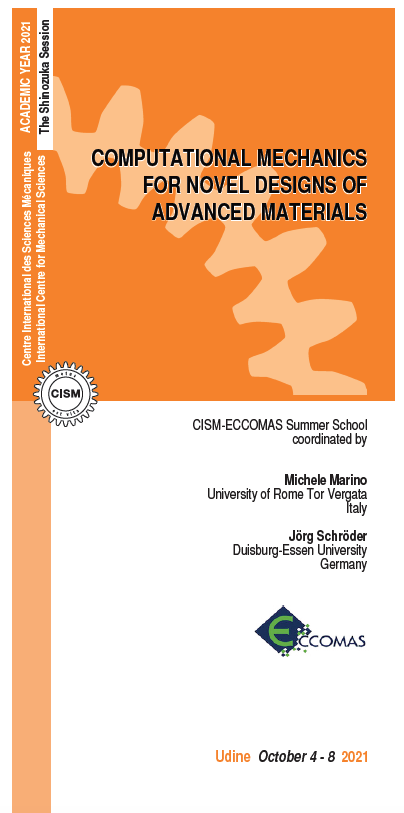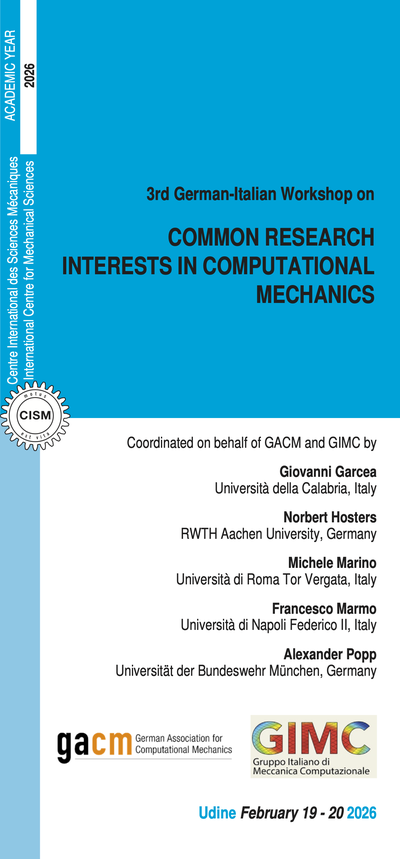Recent technological advancements open up possibilities of optimizing the functional behavior of structures in engineering applications by adding a stage of design at the material scale. For instance, additive manufacturing enables a superior control in the shaping and patterning of material constituents. This modern rationale poses the question of developing:
1) novel paradigms for material micro/nanostructure,
2) novel methods for the optimization of material topology,
3) novel manufacturing techniques.
The combination of multiple and contrasting materials, with differences in elastic and inelastic responses, is a challenging strategy that could lead to new classes of smart behaviors. For instance, this approach is followed by Nature, where biological tissues are hierarchically optimized by means of chemo-biological mechanisms. Hence, the significance and the need of novel material design approaches has been highly increasing in recent years.
Computer-assisted techniques allow to speed-up and reduce the costs of optimization procedures for material topology and constituents’ properties. The predictive capabilities of numerical simulations are highly affected by the accuracy and robustness of constitutive models and how effectively constitutive formulations are translated into computational environments. Therefore, the development of advanced computational approaches for the analysis and the modelling of material responses arises as an emergent and urgent topic.
The workflow for the design of advanced materials is associated with major issues which involve several aspects at the cutting edge of Computational Mechanics. From the engineering point of view, the optimization of computer-assisted techniques is crucial and it is based on the delicate balance between accuracy, robustness and cost. To reach this goal, a solid understanding of methodological aspects and a wide knowledge of available approaches are essential.
The aim of the course is to present theoretical fundamentals, the current state-of-the art, and future directions of “computational approaches for the analysis of the mechanics of materials” with the aim of “providing a modern perspective on in silico tools for the design of advanced materials”.br> The homogenization problem will be faced coupling multiscale and multiphysical analyses. Advanced computational approaches will be presented, highlighting advantages and disadvantages of traditional and novel techniques in different case studies. Materials for modern engineering demands will be focused, spanning from metamaterials, through smart hydrogels and magneto-mechanically coupled composites to MEMS. The described theoretical and methodological approaches will allow to discuss aspects of key importance through the entire material production process: starting at the design stage, through topology optimization, up to material manufacturing.
The course will appeal to doctoral students and postdoctoral researchers from academia and industry with an interest in the constitutive modeling of multiphysical and/or multiscale response of materials, and with a background in engineering or in material sciences.
Geers MGD, Peerlings RHJ, Hoefnagels JPM, Kasyanyuk Y, 2009. On a Proper Account of First- and Second-Order Size Effects in Crystal Plasticity. Advanced Engineering Materials 11:143-7.
Groen JP, Sigmund O, 2018. Homogenization-based topology optimization for high-resolution manufacturable micro-structures. Int. J. Numerical Meth. Eng. 113:1148-63.
Labusch M, Schröder J and Lupascu DC, 2019. 3D magnetostrictive Preisach model for the analysis of magneto-electric composites. Archive of Applied Mechanics 89:1011-30.
Marino M, Wriggers P, 2019. Micro-macro constitutive modeling and finite element analytical-based formulations for fibrous materials: A multiscale structural approach for crimped fibers. Comput. Methods Appl. Mech. Eng. 344:938-69.
Marino M, Hudobivnik B, Wriggers P, 2019. Computational homogenization of polycrystalline materials with the Virtual Element Method. Comput. Methods Appl. Mech. Eng. 355:349-72.
Rokoš O, Ameen MM, Peerlings RHJ, Geers MGD, 2019. Micromorphic computational homogenization for mechanical metamaterials with patterning fluctuation fields. J. Mech. Phys. Solids 123:119-37.
Stupkiewicz S., 2007 Micromechanics of Contact and Interphase Layers, Springer Berlin Heidelberg New York.
Tuma K, Stupkiewicz S, Petryk H, 2018. Rate-independent dissipation in phase-field modelling of displacive transformations. J. Mech. Phys. Solids 114:117-42.
Wessels H, Weißenfels C, Wriggers P, 2018. Metal particle fusion analysis for additive manufacturing using the stabilized optimal transportation meshfree method. Comput. Methods Appl. Mech. Eng. 339:91-114.
Wu J, Aage N, Westermann R, Sigmund O, 2018. Infill Optimization for Additive Manufacturing - Approaching Bone-like Porous Structures, IEEE Trans. Vis. Comput. Graph 24:1127-40.
6 lectures on: Mechanics of mechanical metamaterials and size-dependent effects: computational methods for instability-driven metamaterials; comparisons between full-scale simulations and a micromorphic homogenization approach; modelling of size-dependent microsystems with application to strain gradient plasticity models used for metallic thin films and MEMS applications.
6 lectures on: General principles for the development of constitutive laws and multiscale/multiphysics models: basic mathematical requirements; micromechanical approach for material homogenization (analytical and quasi-analytical methods); thermodynamic balance for chemo-mechanical systems with applications to smart hydrogels and biological tissues.
6 lectures on: Magneto-mechanical problems: physical basics of magnetism at the atomistic scale and exchange energies; macroscopic hysteresis curves given by magnetocrystalline anisotropies; balance laws and continuum mechanical approach; magneto-mechanical constitutive models; conforming H(curl) finite element formulations.
6 lectures on: Topology optimization for multiscale and extremal material design: numerical homogenization techniques, adjoint-based sensitivity analyses and gradient-based design update schemes for topology optimization; optimal microstructures, relations to additive manufacturing infill and applications in acoustic, electromagnetic and optical wave propagation.
6 lectures on: Mechanics of sharp and diffuse interfaces: laminated microstructures; evolution of microstructures and computational approaches for propagating interfaces; interfacial energy and size effects with application to martensitic microstructures and instabilities of Lüders-band type in shape memory alloys.
6 lectures on: Computational modeling in material mechanics: the virtual element method (VEM) with applications to polycrystalline structures and damage mechanics; continuum-based frameworks for finite deformation phase change problems; mesh-free methods with applications to selective laser melting in additive manufacturing.
The registration fee are:
- Participation in presence, 600.00 Euro + VAT*
This fee includes a complimentary bag, four fixed menu buffet lunches (on Friday upon request), hot beverages, download- able lecture notes.
- Participation online, 250.00 Euro + VAT*
This fee includes downloadable lecture notes.
Applicants must apply by September 5th for the "on-site" participation, and by September 26th for the "on-line" participation. Application forms should be sent on-line through the following web site: http://www.cism.it. A message of confirmation will be sent to accepted participants. Applicants requiring assistance with the registration should contact the secretariat at the following email address cism@cism.it.
Applicants may cancel their course registration and receive a full refund by notifying CISM Secretariat in writing (by email to cism@cism.it) no later than two weeks prior to the start of the course.
Cancellation requests received during the two weeks prior to the start of the course will be charged a 50.00 Euro handling fee. Incorrect payments are also subject to a 50.00 Euro handling fee.
A limited number of participants from universities and research centres who are not supported by their own institutions can be offered lodging and/or board, if available, in a reasonably priced hotel or student guest house.
Requests should be sent to CISM Secretariat by July 26, 2021 along with the applicant's curriculum and a letter of recommendation by the head of the department or a supervisor confirming that the institute cannot provide funding. Preference will be given to applicants from countries that sponsor CISM.
Information about travel and accommodation is available on the web site www.cism.it, or can be mailed upon request.
* where applicable (bank charges are not included), Italian VAT is 22%.





